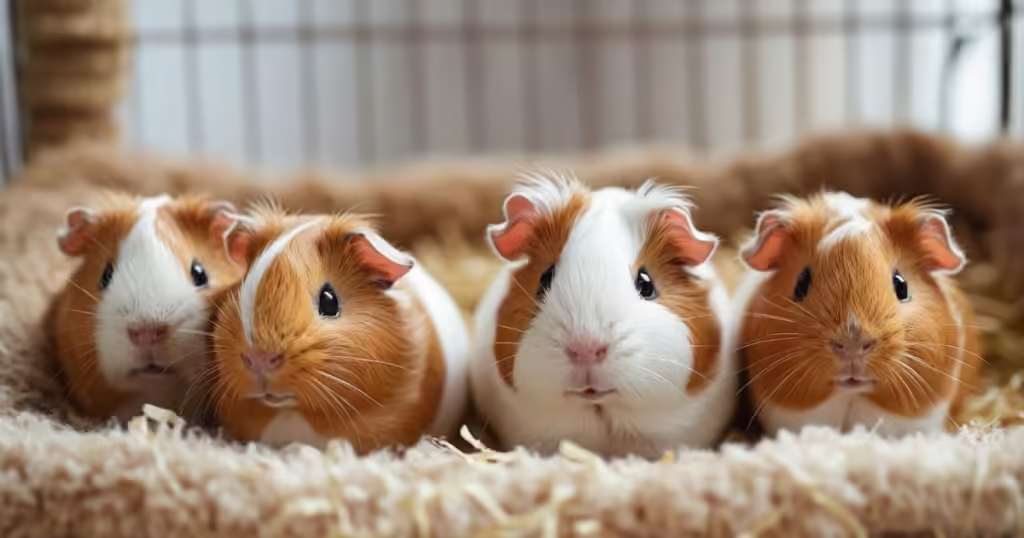Introduction: Why Guinea Pig Treats Matter for Their Health and Happiness
Guinea pigs are wonderful pets, but their health relies on the right diet. As a responsible guinea pig owner, it’s crucial to ensure your pet gets the best care, including healthy guinea pig treats. These treats not only add variety to their diet but also provide essential nutrients to help maintain their health. It’s important to choose the right treats since guinea pigs have sensitive stomachs, and the wrong ones can upset their digestion (Guinea Lynx).
Beyond nutrition, treats are an excellent way to build a strong bond with your guinea pig. They can be used as rewards during training, helping teach your guinea pig new behaviors while also strengthening trust between you and your pet (PetMD).

In this guide, we’ll cover everything you need to know about guinea pig treats. We’ll discuss what makes a healthy treat, the best store-bought options, simple homemade recipes, and how to use treats for training and bonding. Plus, we’ll help you choose the best treats based on your guinea pig’s age and health needs.
- Introduction: Why Guinea Pig Treats Matter for Their Health and Happiness
- What Makes a Healthy Guinea Pig Treat?
- Types of Guinea Pig Treats You Can Buy
- Homemade Guinea Pig Treat Recipes
- Best Guinea Pig Treats for Bonding and Training
- How to Choose the Best Guinea Pig Treats for Your Pet
- Treats to Avoid: What Not to Give Your Guinea Pig
- Frequently Asked Questions About Guinea Pig Treats
- Conclusion: Recap and Final Thoughts on Guinea Pig Treats
What Makes a Healthy Guinea Pig Treat?
Understanding what constitutes a healthy guinea pig treat is key to selecting the best options. Guinea pigs are herbivores, and their diets should include plenty of fiber and vitamin C.
Nutritional Needs for Guinea Pigs
- Fiber: Fiber is crucial for a guinea pig’s digestive health. It can be found in hay and certain vegetables.
- Vitamin C: Guinea pigs can’t produce their own vitamin C, so they need to get it from their diet, especially from fruits and vegetables like oranges, strawberries, and bell peppers.
- Low Sugar: Be cautious with sugar content. Too much sugar can lead to obesity, diabetes, and dental issues.
Harmful Ingredients to Avoid
When selecting guinea pig treats, avoid harmful ingredients like:
- Artificial flavors or preservatives, which can upset digestion.
- Xylitol, a sweetener toxic to guinea pigs.
- Excessive sugar, which can lead to health problems.
Always read the label carefully and opt for natural, wholesome options.
Moderation Is Key
Even the healthiest treats should be given in moderation. Overfeeding can cause obesity, so aim to offer treats 2-3 times a week, adjusting based on your guinea pig’s weight and health.
Types of Guinea Pig Treats You Can Buy
Here are the best types of guinea pig treats you can find at pet stores:

Hay-Based Treats: A Must for Dental and Digestive Health
- Timothy Hay Cubes: These provide fiber and promote dental health by encouraging chewing.
- HayPigs Tasty Rainbow Pig’n’Mix: A blend of Timothy hay, herbs, and flowers, offering variety and healthy digestion.
Vegetable and Fruit Snacks: A Boost for Vitamin C and Hydration
- Red Peppers: High in vitamin C and low in sugar, they’re one of the healthiest fruit treats.
- Cucumbers: These are hydrating and low in calories, perfect for regular treats.
- Carrots: While higher in sugar, carrot slices are a sweet option for occasional treats.
Chew Sticks and Bites: Essential for Healthy Teeth
- Chew Sticks: Made from Timothy hay or other fiber-rich materials, these treats help prevent boredom and keep teeth in check.
Homemade Guinea Pig Treat Recipes
Making homemade treats allows you to ensure your guinea pig gets the best, most nutritious snacks.

Healthy Treat Ideas:
Carrot-Based Bites: To make a healthy homemade treat, mix grated carrots with rolled oats and Timothy hay. Form the mixture into small balls and bake at a low temperature until they’re crunchy. These carrot-based bites provide your guinea pig with fiber and essential nutrients for a balanced diet.
Apple-Parsley Mix: For another simple treat, combine finely chopped apples (without seeds) with fresh parsley and some crushed hay. Once mixed, bake at a low temperature to create a vitamin-rich, tasty snack. These ingredients are a good source of vitamin C and fiber, supporting both digestion and overall health.
What to Avoid
- Chocolate, onions, garlic, and avocados are toxic to guinea pigs and should never be used.
- Nuts, seeds, and dairy are also harmful and difficult for guinea pigs to digest.
Benefits of Homemade Treats
Homemade treats offer the advantage of full control over ingredients, ensuring that your guinea pig enjoys fresh, nutritious snacks without harmful additives. By making treats at home, you can customize them to meet your guinea pig’s specific health needs, helping to boost their well-being while avoiding unnecessary sugars or preservatives. This approach supports both their happiness and long-term health.
Best Guinea Pig Treats for Bonding and Training
Treats are great for training your guinea pig and building a strong bond.
Training with Treats
Use small, healthy treats for training. Guinea pigs can learn simple commands, such as coming when called. Dried herbs like parsley or basil are perfect for rewarding good behavior.
Bonding Through Treat Time
Hand-feeding treats is a wonderful way to bond with your guinea pig. Offering fresh herbs like parsley or cilantro by hand helps them associate you with positive experiences and trust.

How to Choose the Best Guinea Pig Treats for Your Pet
Every guinea pig is unique, so it’s important to choose treats that suit their age, health, and preferences.
Age and Health Considerations
- Young Guinea Pigs: opt for treats that support healthy growth, like Timothy hay and fresh vegetables.
- Senior Guinea Pigs: Older guinea pigs may need treats that are easier to digest. Look for low-calorie options that promote overall health.
Trial and Error with New Treats
Introduce new treats gradually to see how your guinea pig responds. Monitor their health for any signs of digestive upset and adjust accordingly.
Treats to Avoid: What Not to Give Your Guinea Pig
Certain foods should never be given to guinea pigs:
- Toxic Foods: Chocolate, onions, and garlic are highly toxic.
- Processed Treats: Avoid treats with artificial colors, flavors, and preservatives, which can cause digestive issues.
Signs of Overfeeding
Overfeeding your guinea pig can lead to health problems, so it’s important to recognize the signs early:
- Weight Gain: Rapid or excessive weight gain is a major sign of overfeeding. This can lead to obesity, which increases the risk of joint problems, heart disease, and other health concerns.
- Lack of Activity: Guinea pigs that have been overfed may become less active or lethargic, as carrying extra weight can cause discomfort and strain on their body.
- Digestive Issues: Overfeeding high-sugar treats or too much food in general can lead to digestive problems, such as diarrhea or bloating, indicating that their system isn’t processing food properly.
- Loss of Interest in Regular Diet: If guinea pigs eat too many treats, they may lose interest in their regular food, particularly hay and vegetables, which are essential for their health.
- Urinary Problems: Excessive feeding of calcium-rich foods can contribute to urinary tract issues, like kidney stones, which are painful and require veterinary care.
Best Practices: To avoid overfeeding, limit treats to 2-3 times a week, and monitor your guinea pig’s weight and behavior regularly. If you notice any of these signs, it’s important to consult a veterinarian to adjust their diet accordingly. Ultimate Guinea Pig Care Guide for Beginners: Tips for a Happy, Healthy Pet
Frequently Asked Questions About Guinea Pig Treats
Can Guinea Pigs Eat Fruit Every Day?
Fruit should be given in moderation (2-3 times a week) due to its sugar content. Strawberries, apples, and oranges are good choices.
Are Store-Bought Treats Safe for Guinea Pigs
Some store-bought treats are safe, but always read the label for harmful additives. Look for high-quality, natural, and hay-based options.
How Often Should I Give Treats to My Guinea Pig?
Offer treats 2-3 times a week. Monitor your guinea pig’s weight to avoid overfeeding.
What Are the Best Treats for Sensitive Stomachs?
For guinea pigs with sensitive stomachs, stick to fiber-rich treats like Timothy hay and parsley.
What can guinea pigs not eat?
Guinea pigs should avoid chocolate, onions, garlic, avocado, citrus fruits in excess, raw potatoes, nuts, seeds, dairy, iceberg lettuce, and rhubarb. These foods are harmful or toxic to guinea pigs.
Can guinea pigs drink milk?
No, guinea pigs should not drink milk. Guinea pigs are lactose intolerant, meaning they cannot properly digest milk or dairy products. Consuming milk can lead to digestive upset, diarrhea, and other health issues. It’s essential to provide them with fresh water instead, which supports their hydration and overall health. Always avoid offering milk or dairy-based products to your guinea pig.
Can Guinea Pigs Eat Spinach?
Spinach can be fed in moderation. It’s high in vitamin C but also contains oxalates, which can interfere with calcium absorption. Offer it occasionally, alongside other greens like romaine lettuce. Always wash it before serving.
Conclusion: Recap and Final Thoughts on Guinea Pig Treats
In conclusion, selecting the right guinea pig treats is essential for their well-being. Focus on healthy, natural treats like hay-based options, fresh vegetables, and homemade snacks to support their nutritional needs. Treats should be given in moderation to prevent obesity and promote digestive health.

Additionally, using treats can enhance bonding and training, helping your guinea pig feel more connected to you. By paying attention to your guinea pig’s individual needs, preferences, and health requirements, you can create a balanced treat routine that strengthens both their physical and emotional well-being. Treat time doesn’t just reward your guinea pig—it’s an opportunity to build a stronger, happier bond with your furry friend.



